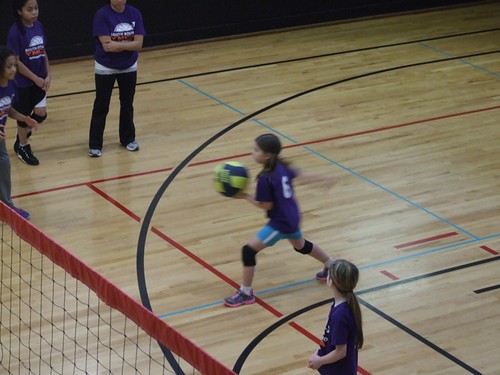
I never played sports when I was growing up. My parents, the radical homeschoolers and classical musicians that they were, had no interest in sports, and so we never pursued them. My experiences were of ballet, musical theater, a bit of gymnastics, some competitive rhythmic gymnastics, and a tiny smattering of martial arts. Competition was all individual, and intense. And I never knew what it felt like to be on a team (no, being in a musical or a dance group didn't feel the same) until I joined the Army when I was eighteen.
As parents, my husband and I have always talked about giving our kids the things we most treasured as kids and also filling in what we perceived as the gaps. Since we are very different people and had different childhoods, that produces quite the list. Neither of us did sports, though, so we had that in common when we've tried to fill in that gap. We started off with Tball, then baseball. I got us all mitts, and it is one of the parenting accomplishments that I am most proud of that I actually stuck with playing catch with my kids and can now catch a ball at least some of the time. Since then the kids have chosen to try basketball and volleyball, and once again the parents have had to figure out a new sport and some very basic competence with a different type of ball.
All sorts of studies and books about raising girls suggest that there are huge benefits to team sports for them. My kids are both playing sports through the YMCA, which heavily emphasizes good sportsmanship and other good values over "winning", and I think it's been really good for both my son and my daughter to experience being on a team.
Neither is a gifted athlete. Neither is particularly competitive or aggressive, either. But they have worked hard and improved their skills, at times really enjoying themselves and definitely feeling the thrill of accomplishment when they master a new skill. And I'm satisfied that when they are eighteen years old they won't flinch and say they've never had a ball thrown at them in their lives. We aren't fanatics about it, and I don't ever want sports to eat up all our family time, but I do want my family to always be physically active, always playful, and always trying to push ourselves to improve. So far, that's been found in the arena of youth sports. Soon, as my son gets older and the schedules get insane (why no "relaxed and casual" middle school sports? Does it have to become such a big deal?), we'll have to find another way to accomplish those same goals. But for the elementary years, Y sports have been wonderful for us.
How do you do sports and physical fitness in your homeschool?



